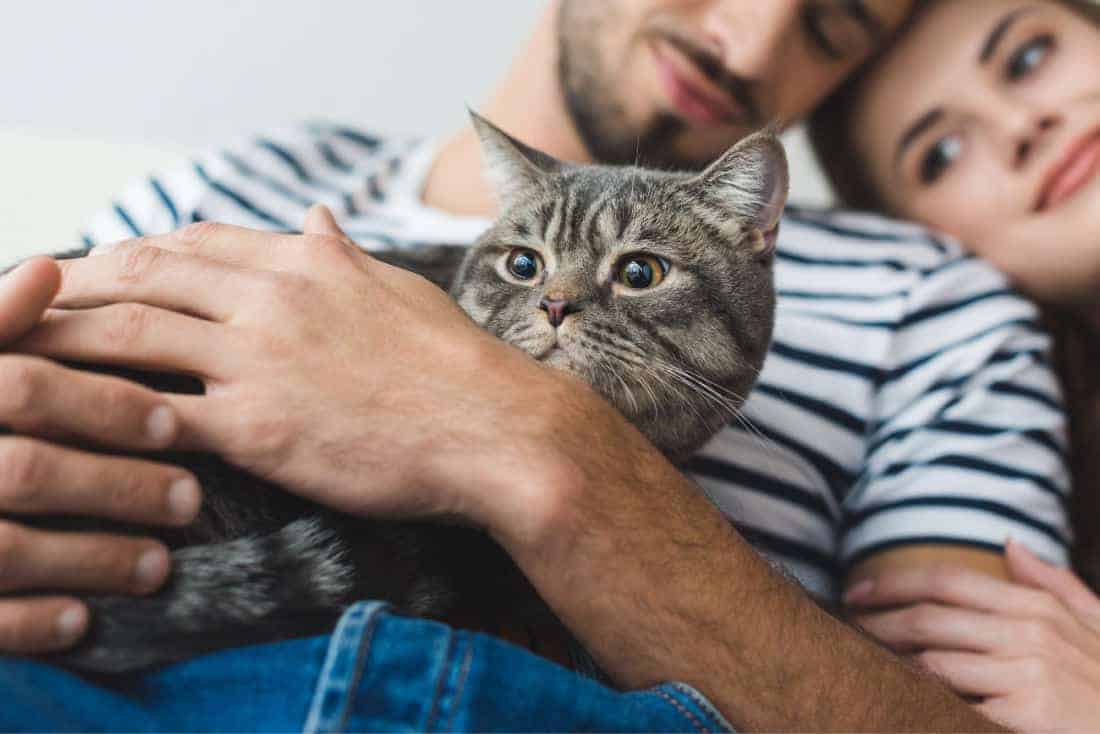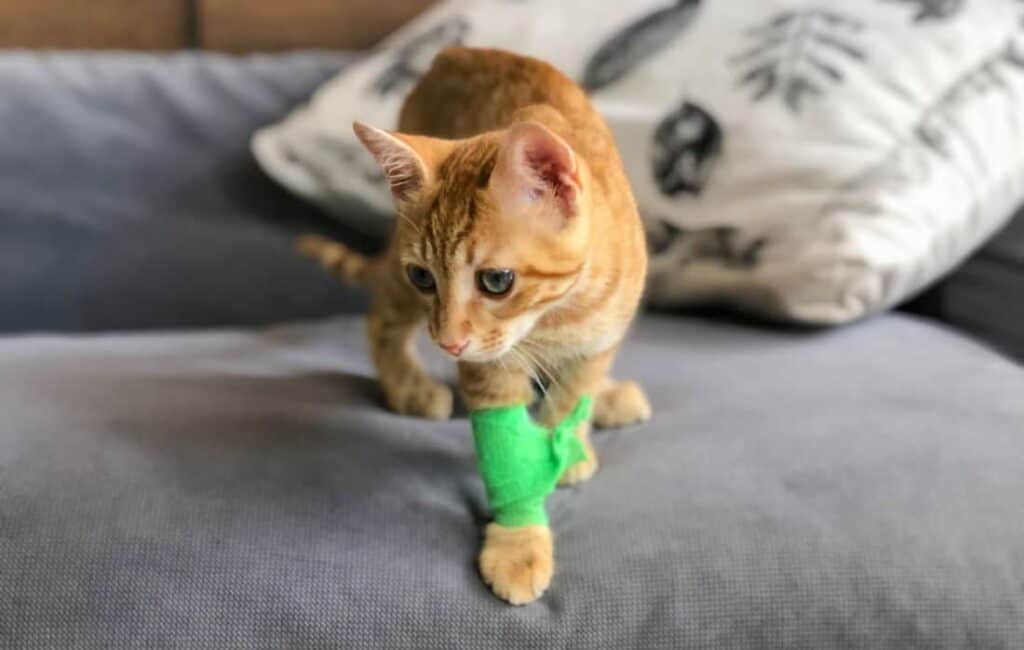Why Does My Cat Meow When I Pick Her Up?

“Why does my cat meow when I pick her up?” is a question I’ve heard over and over again from many cat owners.
Cats meow for a variety of reasons, like expressing their affection or their discomfort. So, if your cat meows whenever she’s picked up, she might be in pain or trying to tell you that you’re carrying her incorrectly. She might also be meowing to let you know she appreciates and loves you or that she missed you when you were away.
So, why do cats meow when you pick them up? Not all cats like being picked up and your cat is showing her displeasure by meowing. Cats are most comfortable making their own decisions when it comes to being picked up and held.
Listening to your cat’s meows will help you determine what your cat is telling you. Keep in mind that cats have up to 60 variations of a simple meow, so recognizing context clues is of utmost importance.
With that being said, let’s take a look at some of the most common reasons why a cat meows whenever she’s being picked up!
She’s Saying Hello
Cats sometimes meow when their owners pick them up as a form of greeting, especially if they haven’t seen you in a few hours. They’re saying, “I missed you!” or, “Welcome home!” or, “You’re here, finally!”
Cats meow when their owners come home or even when they’ve just woken up from a long nap. This means that they’re happy to see their owners and love them. Be proud!
She’s In Pain
On the opposite side of the spectrum, your cat might meow when you pick her up because she’s in pain. Think about it this way: do you like being touched if you’re in pain, even if it’s a mere pat on the back? Most likely not. Body pain causes discomfort and would only amplify when touched.
After I took my kitten to the vet for her first vaccination, she felt sensitive all over and couldn’t stand even being petted. She meowed loudly when I picked her up, louder than average, and would struggle to get away from my grip.

I later found out that she was mildly allergic to one or two components of the vaccine, so I took her back to the vet. I wouldn’t have known if she didn’t meow to tell me.
Remember: cats have a high pain tolerance. This is why it’s essential to look for context clues when your cat meows.
If your cat is meowing because of pain, it’s a cause of concern. When you pick her up, you’ll notice that she meows in an urgent and unpleasant sounding manner. Sometimes, it’s accompanied by growling and/or hissing. She might also try to get away from your grip or scratch you, so you’ll let her down.
Excessive meowing isn’t normal for a cat. She might be telling you, “Ouch! Stop!” or, “That hurts, please let me down!” In such cases, it’s always best to check your cat over for any signs of injury or disease. This is especially true if you own an older cat. If the meowing persists, you might need to take her to a vet.
She’s Being Held Incorrectly
If your cat isn’t injured or suffering from any type of disease but still meows loudly whenever you pick her up, this might mean that you’re not picking her up correctly.
Incorrectly picking up a cat might cause her discomfort or even injury. They’re just like human babies; meowing is the cat version of crying!
There are multiple ways to pick up a cat. Every cat is different, so you might want to attempt several holding techniques until you find one that your cat loves best.
For instance, I found that my cat loves being cradled on her back instead of being flung on my shoulders. Don’t force your cat into a position she’s uncomfortable with to prevent injuring your cat and yourself.
When carrying a cat, never pick her up by the scruff of the neck. Scruffing a cat removes her sense of control, leading to stress, anxiety, and fear. It makes a cat feel vulnerable. Plus, it’s painful. Scruffing a cat might potentially lead to a loss of trust, so try to hold her in any other way.
Also, try not to pick her up by her front legs, back legs, or her tail, as this may result in serious injuries. Cats have fragile bones, so don’t be rough with them.
Here are some tips on carrying a cat:
- Approach your cat slowly and let her sniff you before picking her up. Don’t suddenly grab her as it may agitate and startle her.
- Give her a few warm-up pets before picking her up.
- When you pick up your cat, gently press her against your chest so she’ll feel supported. This removes the risk of your cat falling from your arms.
- Only carry your cat in a safe, stress-free environment to prevent her from accidentally scratching you or jumping from your arms.
- If your cat starts struggling or showing signs of discomfort, put her down immediately.
- Never pick up a stray or feral cat if you can help it.
- Always place your cat on four paws when you’re done cuddling her instead of letting her drop from your arms.
She’s Stressed
Cats have bad days, too! Like people, some cats hate being touched or picked up when they’re stressed. In this scenario, your cat might be telling you, “I’m not in the mood, let me down!” or “Today’s not my day, dear owner. I love you, but please don’t carry me!”
Cats get stressed for a variety of reasons. Some of the most common causes for stress in cats include:
- New baby or pet in the household
- Hunger or thirst
- Dirty environment
- Excessive noise
- Territory issues in a multi-cat household
- Unfamiliar pets or people in the house
- Sensitive senses
- Overstimulation due to excessive handling or petting
- Loss of a loved one
- Change in the environment
- Change in routine
- A recent visit to the vet
- Parties, remodeling, and other noisy events
- Offensive scents
When it comes to stress triggers, cats are very much like babies and young children. Other than meowing when picked up or excessive meowing in general, you might notice an increased lack of appetite, inappropriate elimination and/or scratching, hiding, overgrooming, and diarrhea.
There are several ways to prevent stress in cats. One, always make sure that there are enough litter boxes in your house and that they’re always clean. If you have one cat, you need two litter boxes. If you have two cats, you need five litter boxes. And so on. Litter boxes should always be easily accessible for your cats.
The same is said for food and water. Cats need to be fed two times a day. Some cats overeat, so you should always maintain a proper eating schedule to avoid obesity. Water should be accessible at all times, too.
Always make sure that there isn’t too much noise and commotion in your home. If your cats are aggressive with each other, keep them separated. Scratching posts are ideal, too, to prevent boredom and eliminate stress.
And finally, playing with your cat daily will help her feel relaxed, stimulated, and well-loved.
Boy, Pixie and Mary’s Story
My cats of the last decade are pretty typical of many of the cats I have owned over the years when it comes to being picked up. If it was their choice, they would not be picked up.
Boy and Pixie both loved sitting on me, but they always got there of their own free will. I don’t think there are any domestic cats that don’t like being petted and Pixie is no different, but she has no desire to be held or to sit on anyone’s lap.
The one thing Boy, Pixie and Mary learned over the years is if they were being picked up, there was a good chance they were about to be put into a cat carrier. And then their next stop would be the vet. It has been my experience that cats like control over where their feet are planted and picking them up takes that control away.
She’s Angry
No one wants to be picked up when they’re angry, cats included. If a cat is distressed or upset, she’ll show it through her body language and vocalizations. Contrary to popular belief, cats have highly complex emotions. They act in response to an event or situation, depending on how they feel.
You’ll understand that your cat is angry at you through context clues. For instance, if your cat is watching you from afar and doesn’t greet or play with you like she usually does, she might be angry at you.
You’ll also notice her giving you “the look”—a look that every cat owner understands. If you’re late with feeding time or disturb her while she’s asleep, she’ll be upset and give you that annoyed, angry look.
She’d also suddenly get super fluffy when you walk near her. This “fluffing” ability is one of the most prominent signs that your cat is either angry or afraid. Let’s not forget the growling, hissing, and spitting.
Another indication of anger is if her tail is twitchy, swishing quickly back and forth from side to side. You’ll see this when you pick her up, paired with some meowing or growling.
She Just Doesn’t Like It
Cats are adorable little creatures, so it isn’t a surprise that we love carrying and cuddling them. Since cats are baby-sized, it triggers the natural protective instincts that want them close to us no matter what. Plus, that cute face! Those eyes! Those ears! How can we ever resist?
Unfortunately, some cats just don’t like being picked up. It’s a heartbreaking truth that all cat owners must accept.

Even if you know how to properly handle a cat, this doesn’t mean that you should force a cat close to you. Some cats become quite anxious or even frightened when you pick them up because they don’t feel like they’re in control.
Cats dislike having a limited ability to escape and might start panicking and struggling to get away from you. This might be related to past trauma. Maybe the cat was accidentally dropped in the past, or she might associate being picked up with the vet. Others simply feel unstable when held and would rather stay on the ground.
The good news here is this: it’s entirely possible to help your cat become more comfortable with being held. Positive reinforcements help a lot; giving her treats and little pets whenever she’s being carried will help her associate being in your arms as good and safe.
Once she’s comfortable with being held, start picking her up several times a day for short periods until she gets used to it.
Final Thoughts
Cats are vocal animals. Since they can’t talk, it’s your responsibility to understand how to read your cat’s body language and what it means when she meows.
If your cat meows excessively or sounds stressed when you pick her up, it’s best to visit a vet to rule out any medical condition she might have. Don’t forcefully carry a cat if she’s uncomfortable or doesn’t like it to prevent injuring yourself and your cat. Good luck!
